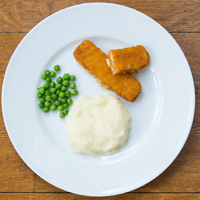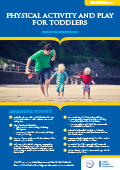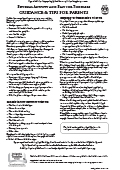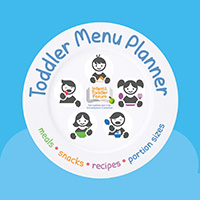
Use our Toddler Meal planning tool to ensure your 1-4 years old receives a balanced diet every day.
Find out more >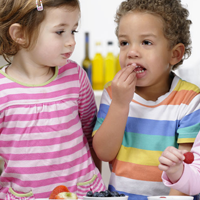
Use our toddler food tracker to check that your 1-4 year olds are getting a good balance of foods and activity
Find out more >
This educational programme for frontline professionals contains a range of practical resources on infant feeding.
Find out more >
Guidance & Tips for Parents
Toddlers learn eagerly and most want to try new activities. Encouraging your toddler to keep physically active will help him/her to:
- Develop movement skills
- Keep up with friends in the playground and in sporting activities as they get older
- Stay a healthy weight
- Keep a healthy heart.
If toddlers learn to enjoy games and sport and then continue playing them at school, their school work will benefit.
Be patient; some toddlers take longer than others to learn new skills. Some are better co-ordinated than others. Keep gently encouraging, make it fun and give lots of praise.
Keeping you and your toddler more active:
- Park your car further away from where you are heading so everyone has a walk to get there
- Climb stairs together rather than using escalators and lifts
- Encourage your toddler to walk everywhere rather than confining him/her in a stroller – use reins to keep him/her safe while letting him/her walk.
Ideas to make walking more fun:
- Count something as you go along e.g. birds, trees, aeroplanes, white cars
- Have a race to a visible landmark – give your toddler an earlier start or let him/her use a scooter or bike
- Visit the playground on your way to or from somewhere and allow your toddlers to run, climb and play on the equipment for 20-30 minutes
- Kick piles of leaves during walks on autumn days.
Fun activities for indoors or outdoors
- Play ‘keep it up’ with a balloon
- Have a dance-a-thon
- Play catch with a bean bag
- Plan an in/outdoor treasure hunt
- Play musical statues
- Play hide and seek
- Read stories and sing songs that require actions in time with the words
- Dance or jump to music
- Make a den.
Rough and tumble play is also fun, particularly for boys, so only stop it if it seems unsafe. Fathers often play rough and tumble with their children – which they enjoy.
Keeping your toddler active outdoors
If you don’t have your own garden take your toddler to a playground or local park every day:
- Play hide and seek
- Play chasing games
- Find a slope to do roly polys
- Play with a ball – encourage your toddler to kick, throw or roll it and learn to catch a large soft ball with both hands
- Play with a bat and ball; help your toddler hit a ball along the ground or gently throw it to him/her underarm and encourage them to hit it with the bat
- Go on a nature hunt. You can collect leaves/twigs/berries to make a decoration/collage
- Play in a paddling pool on warm summer days
When it rains: put on waterproofs and go for a walk and jump in puddles.
When it snows: make and throw snow balls, build a snowman, fill a sledge with soft toys/dolls and pull them around the park/garden, make snow angels by lying on your back in soft snow and moving your arms up and down.
Check out your local amenities and go swimming, to a soft play area, try out active play sessions run by children’s centres or programmes such as SoccerTots® and Tumble Tots.
Help your toddler achieve these skills by making sure s/he has opportunities to try. If someone is showing him/her, then s/he can learn to copy:
- By the age of 2-3 years: jumping, hopping, galloping, climbing a climbing frame, kicking a ball, throwing a ball and hitting a ball with a bat
- By the age of 3-4 years: catching a ball, riding a scooter, riding a two-wheeled bike with stabilisers.
Messy play: Getting used to putting their hands in different textures can help toddlers who are fussy about their food.
Pretend play: When toddlers play with toys and other objects and pretend they are people, they are learning about the world around them.
Sleep: Make sure your toddlers gets about 12 hours sleep in each 24 hours – toddlers perform better if they are getting enough sleep and they sleep better after a day full of activity.


